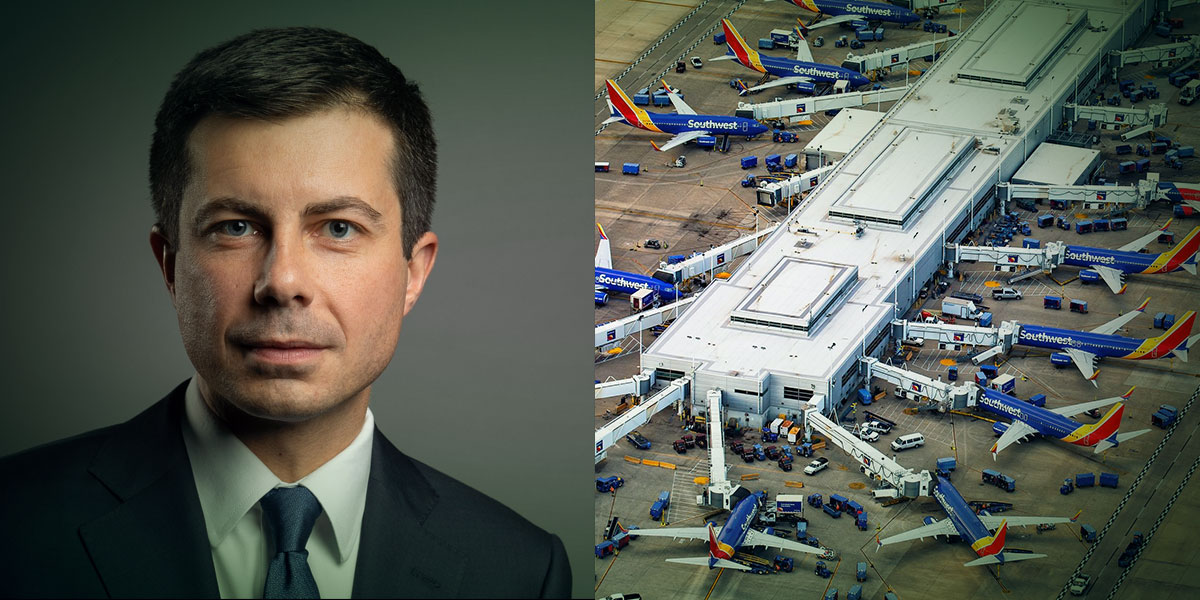In December, a winter storm grounded Southwest Airlines for nearly a week, even though major airlines quickly resumed service.
In January, all flights were temporarily grounded due to the crash of a Federal Aviation Administration (FAA) system. The consequences of these debacles illustrate accountability in markets and politics.
A winter storm across the northern United States snarled air and ground Christmas travel. But days after Christmas, Southwest was still cancelling about half of its flights, almost 10 times more than any other airline.
Southwest’s disruption must then have involved additional factors. One appears to be Southwest’s point-to-point route structure in contrast with other airlines’ hub-and-spoke systems. This seemingly left many planes and crews stranded in weather-impacted cities. Failure of an outmoded crew tracking system is a second culprit, as it kept available crews from being used.
The FAA’s Notice to Air Missions (NOTAM) system crashed on Jan. 11, causing 7,000 flight delays and 1,000 cancellations. NOTAM delivers safety messages to flight crews prior to takeoffs, prompting the FAA to suspend takeoffs until the aged computers were back online.
Neither debacle was unexpected, since out-of-date technology was bound to eventually crash when stressed. Timely investment in new systems could have avoided the debacle. Why did this not happen and what consequences have Southwest and the FAA faced?
Gary Kelly was Southwest’s CEO from 2004 until early 2022, when current CEO Bob Jordan took over. Mr. Kelley’s background was in accounting, and he reportedly was not convinced of a sufficient return on investing to modernize crew communications.
An alternative interpretation here is that the potential for December’s meltdown was too hypothetical to register in a cost analysis. New CEO Mr. Jordan was talking in November about overhauling antiquated systems, but then it was too late.
The FAA’s failure combines government’s long-standing underinvestment in infrastructure with mindless bureaucracy. The NOTAMs have been called useless. One aviation group described them as presenting “information in a coded, upper case, incredibly un-human-friendly format,” and “overloaded with irrelevant information.”
The NOTAMS included items like grass cutting at airports, resulting in reports upward of
100 pages. Reason’s Christian Britschgi reports how two Air Canada pilots in 2017 missed a notice about a closed runway buried in a report and almost collided with four other planes.
Let’s turn now to consequences. Mess ups cost businesses customers and stock value. Stock markets are forward looking; investors evaluate everything about a company, its competitors, and the economy to project future profitability. Once all current information is digested, stock price changes should reflect new information.
Not surprisingly then, Southwest’s stock price fell 11 percent between Dec. 23-27, yielding a $2 billion loss based on market capitalization. The stocks for American, Delta and United fell by only 2 to 3 percent over these days. A formal event study would be needed to confirm attribution, but markets punish businesses for mess ups.
Politics produces criticism. Transportation Secretary Pete Buttigieg has been ripped over the NOTAM failure and will likely face a congressional hearing. Doing poorly as Transportation Secretary could degrade Mr. Buttigieg’s political prospects.
But how many FAA bureaucrats will lose their jobs and pensions over this? Moreover, history shows that failure in the public sector frequently yields budget increases to “fix” the problem.
Political “accountability” has produced continual technological obsolescence at the FAA. In the 1990s the computers running America’s air traffic control system still used vacuum tubes, making the FAA scour the former Soviet bloc for spare parts.
The FAA today tracks planes with paper flight strips instead of electronic slips like other
developed nations; a partial transition may be completed by 2031. As Wired magazine
noted, “Modernization, a struggle for any federal agency, is practically antithetical to the
FAA’s operational culture, which is risk averse, methodical, and bureaucratic.”
Every organization will make mistakes. Economic freedom necessarily entails the freedom for businesses to mess up. But because private businesses – unlike government bureaucracies – face financial penalties for their mistakes, businesses must improve or eventually face bankruptcy.
Daniel Sutter is the Charles G. Koch Professor of Economics with the Manuel H.
Johnson Center for Political Economy at Troy University and host of Econversations on
TrojanVision. The opinions expressed in this column are the author’s and do not
necessarily reflect the views of Troy University.










